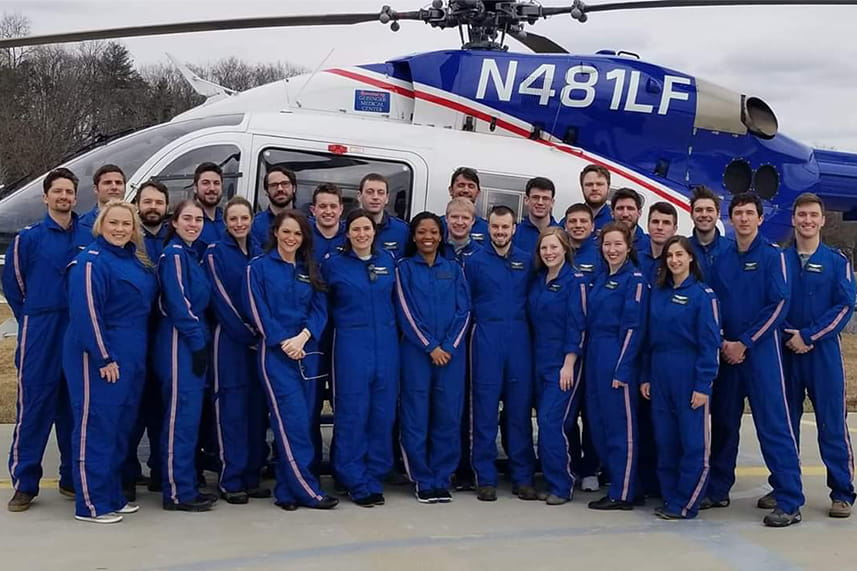
Emergency Medicine Residency
You have the power to save lives. An emergency medicine residency with Geisinger will show you how.
About us
You want to choose the right residency program — and we’re committed to helping you find it.
Ready for a comprehensive, high-quality and personally rewarding experience to prepare yourself for a career in medicine? The emergency medicine program at Geisinger awaits.
Program highlights
The Geisinger Emergency Medicine Residency Program, the 11th oldest continually active program in the country, is a three-year (PGY1-3) program designed to develop practice-ready emergency physicians who contribute to and become leaders in their communities and specialty. The program will help you become a proficient, astute, empathetic and enthusiastic clinician who is well-rounded and capable of success across the spectrum of emergency medicine practice. Our faculty have a wide range of expertise in emergency medicine. They are recognized for their leadership within state and national organizations, including the Pennsylvania Department of Health, the Pennsylvania College of Emergency Physicians (PACEP), the American College of Emergency Physicians (ACEP), the Council of Residency Directors in Emergency Medicine (CORD), the National Association of EMS Physicians (NAEMSP) and the Society for Academic Emergency Medicine (SAEM).
As a premier training program in emergency medicine, we serve a unique rural population, offering quaternary care capabilities in a nationally recognized, integrated health system. Geisinger provides a long-standing, innovative and nationally recognized focus on quality patient care. Clinical experiences include practice environments that span rural and urban community hospitals to a large regional referral center with Level I trauma services and a certified comprehensive stroke program. The system covers 42 counties in northeastern and central Pennsylvania. Our primary site also has a Level II pediatric trauma center with a dedicated children’s hospital, providing a robust experience in the care of critically ill children. We serve our community via Geisinger Life Flight®, one of the nation's oldest and largest air critical care transport services.
Our forward-facing emergency medicine residency curriculum incorporates the knowledge, skills and abilities included in the American Board of Emergency Medicine (ABEM) clinical practice of emergency medicine across the clinical and didactic experiences. In addition to integrated community-based and pediatric clinical emergency medicine experiences, as a resident, you’ll have the opportunity to be a member of the flight crew on Geisinger Life Flight throughout your training. Our innovative didactic curriculum employs the best evidence methods for effective adult learning, balancing traditional lecture-based content with simulation, procedure labs, individual interactive instruction, flipped classroom activities and focused written and oral board review.
Interested in an emergency medicine clerkship?
Visit the Geisinger Emergency Medicine program page for an overview.
Life Flight
The Geisinger Life Flight program began in 1981 with a single airbase on campus at Geisinger Medical Center. Since that time, we have grown to six air bases, nine aircraft and two critical care ground trucks. Yearly, we do more than 3,500 patient transports. The program is entirely Geisinger-owned and operated under our part 135 FAA certificate. We are one of a handful of residency programs that truly incorporate the emergency medicine residents into Life Flight as part of the flight team.
You’ll be issued your own flight suit during intern orientation. During your intern year, you will do two flight shifts per week in your emergency medical services (EMS)/Life Flight block. As an upper level, you will be regularly scheduled for flight shifts during your Emergency Department (ED) blocks. At the end of your intern year, you’ll earn your status as a medical command physician in Pennsylvania. This allows you to guide the crews in the care of patients you’re treating. The Life Flight program does both inter-facility and scene calls. Whether landing on a hospital roof or the interstate, you’ll gain invaluable experience in the prehospital critical care environment.

